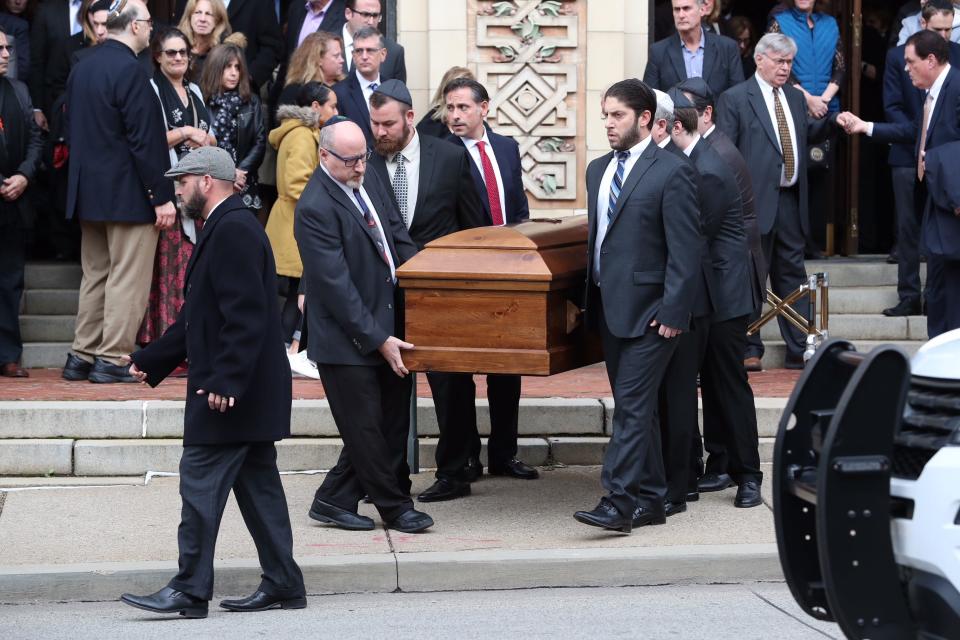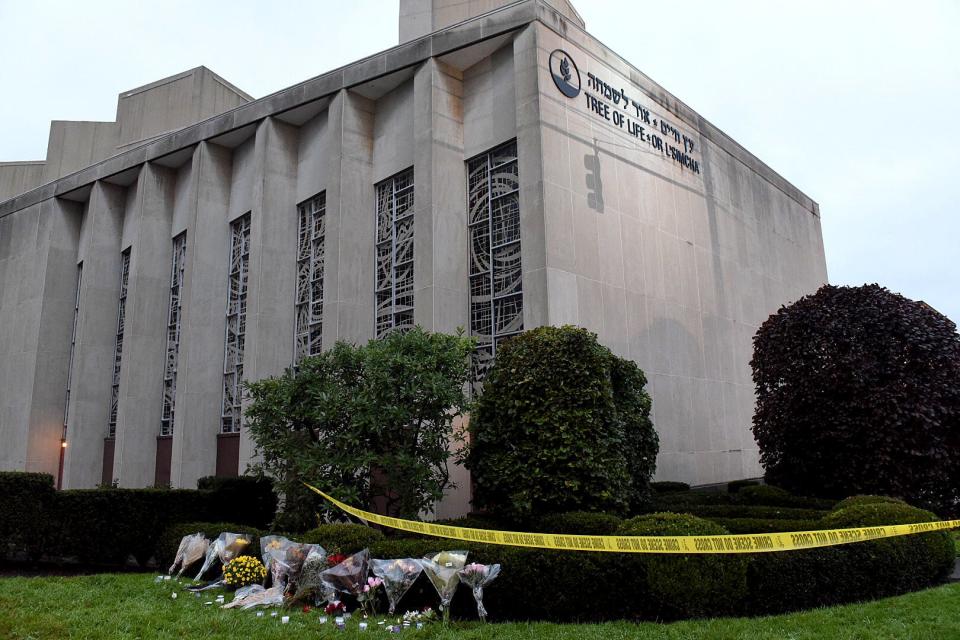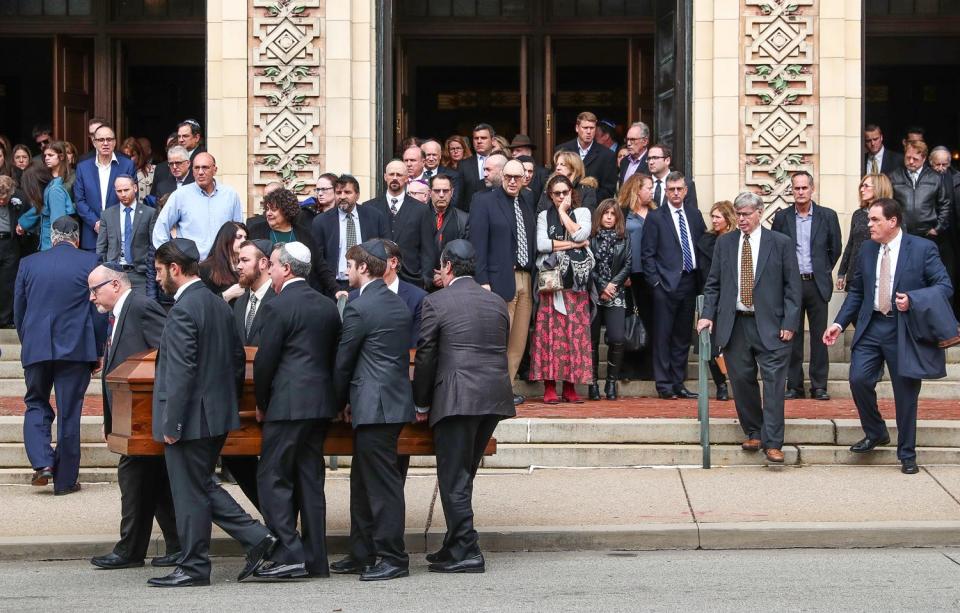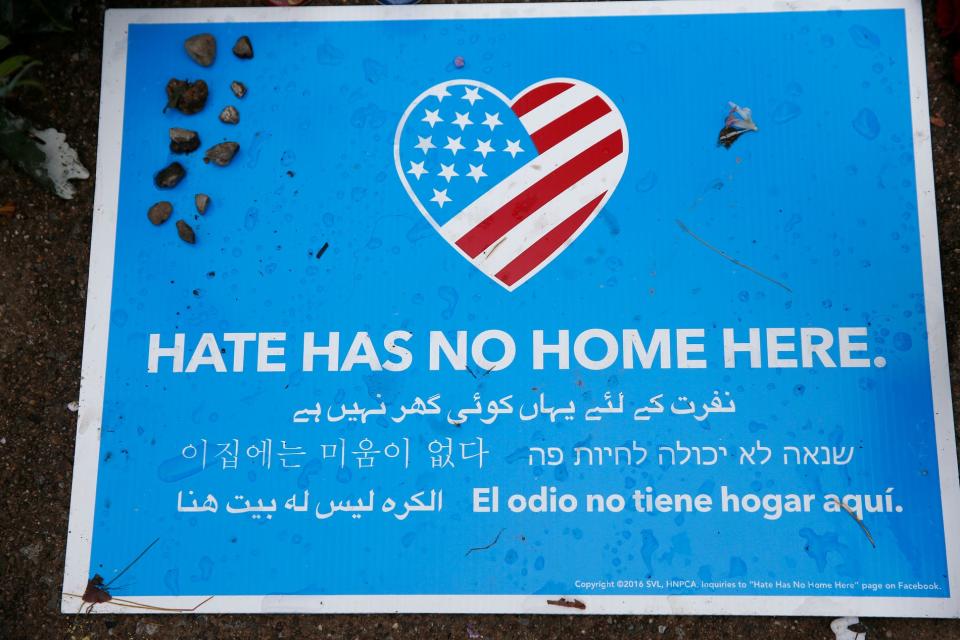'What can we do to make a difference?' Community seeks light in Tree of Life darkness
- Oops!Something went wrong.Please try again later.
PITTSBURGH — Outside the federal courthouse, Maggie Feinstein talks about the "heavy weight of the horrors" wrought by the man accused of carrying out the most deadly antisemitic attack in this nation's history.
With the start of the trial in the Pittsburgh synagogue shooting Tuesday, that weight, Feinstein said just days earlier, now spreads from the shoulders of survivors, victims' families and witnesses "to many more people within our community."
"I'm hearing some broader anxiety in the community, and I want to remind people that it's not your duty to absorb every graphic detail in order to provide support to each other," Feinstein said during her May 25 news conference, just after the jury pool had been shrunk to 18 people, including six alternates.
Robert Gregory Bowers, 50, faces 63 federal hate crime and related gun charges in the Oct. 27, 2018, killing of 11 people from three congregations at the Tree of Life synagogue in the city's Squirrel Hill neighborhood. In the likelihood of conviction, a jury will then decide if Bowers should be executed or spend the rest of his life in prison.
For Feinstein, who runs the 10/27 Healing Partnership, a federally funded "resiliency center" formed in the wake of the attack, the trial is more evidence that the process of healing is not linear. That's why she's urging the community to conscientiously consider where to put its energy, as prosecutors and witnesses testify in detail about the traumatic events of that day.
"Instead of learning more about the hatred that took place on that day, learn about the ways we all can prevent acts like this by interrupting negative stereotypes and beliefs about each other," said the professional counselor. "We can learn from history in this country and other countries and apply that to what we teach our children, and how we help families and friends around us."
Coping with and healing from the trauma of the attack has taken on many forms for the city's Jewish community and the Squirrel Hill neighborhood.
In addition to a trauma therapist, the 10/27 Healing Partnership has grief and trauma-processing support groups, but also more non-traditional therapies that serve as a means for people to take part in wellness programming who might not be willing or might not recognize the need for traditional forms of counseling. The Healing Partnership offers Reiki, yoga, conscious drumming circles, acupuncture, sound bathing and improv workshops that can be "fun and funny," Feinstein said. It even offers forest bathing, an ancient Japanese relaxation exercise with health benefits and a class called "crafting for comfort."
The 10/27 Healing Partnership also works with other community agencies that spearhead projects aimed at driving away hate.
Among them is Achieva, which is a chapter of the Arc. Achieva provides an array of lifelong resources to people with disabilities. Among Achieva's clients were two of the victims in the synagogue shooting.

Inseparable brothers
Brothers Cecil and David Rosenthal were affectionately known as "the boys" in their Squirrel Hill neighborhood,
David, the younger brother, was the quiet one with a sense of humor. Cecil was talkative and outgoing and known by some as the "mayor" of Squirrel Hill. Both were admired for their kindness, generosity and faith.
Born with intellectual and developmental disabilities, Cecil, 59, and David, 56, were inseparable. They shared an apartment owned by Achieva with another man and were driven to the synagogue for Shabbat services that morning by the agency.
Four years and seven months later, the memory of Cecil and David Rosenthal continues to spread joy, instill hope and help heal a grieving Squirrel Hill community through a memorial fund that was established in their honor and a random-acts-of-kindness campaign known as "Love Like the Boys."
"They were happy people and knew how to have fun and really had so many friends in the community, so we just thought what better way to continue their legacy than by doing kind things for others as they would've wanted us to do," said Lisa Razza, director of communications for Achieva.
The Rosenthal family established the Cecil and David Rosenthal Memorial Fund to help others with intellectual and developmental disabilities fulfill their dreams. There's one caveat: It has to be integrated into the greater community, not just something done in solitude or with a group of people who have intellectual or developmental disabilities.
The Rosenthal brothers were the epitome of Achieva's mission toward inclusion and integration, Razza said.
"What still resonates to me to this day is that it wasn't stressed that they had a disability when it hit the news," she said. "They were just like any of the other nine victims. And that's what we want for everyone we support — to not be identified by their disability itself."
As of mid-May, more than 1,500 people from 39 states, Washington, D.C., and five other countries — Canada, Israel, England, Scotland and Switzerland — have donated in excess of $325,000 to the Cecil and David Rosenthal Memorial Fund.

"We have provided a lot of great things — sign language classes, hearing aids, passes to amusement parks," Razza said. "One woman who was a volunteer wanted paid tickets to an event that she was honored at and so that (memorial fund) made that possible for her. We had a family who had a great speech therapist and wanted to continue with that therapist, but it was no longer covered under their insurance. We were able to give them the money."
Then there's "Love Like the Boys," the campaign that encourages anyone to perform a random act of kindness in honor of Cecil and David Rosenthal.
"They were just so well loved in the community, and we thought, what can we do to make a difference, to just take some of that pain away from the people who are really mourning?" Razza said. "That's when we came up with the idea to do acts of kindness in their memory."
Those gestures have come in all forms and in some cases have been shared on a Facebook page. It's been a quarter left on top of a bubble gum machine with a note for a child to donating passes to Disney. Others have painted rocks with kind messages and left them for others to find throughout Pittsburgh and as far away as Italy.
Spreading kindness in the face of hate is among the multitude of ways the community is attempting to heal from the tragedy. Another way comes via political activism.
Advocacy helps heal
On the second floor of the Rudef Shalom Synagogue, Dana Kellerman waits for the small classroom to fill up. Kellerman is the communications chair for the Dor Hadash Congregation, one of the three congregations that calls Tree of Life home. On this day, though, Kellerman is serving in her other role as the policy director for Squirrel Hill Stands Against Gun Violence, which formed a few weeks after the Pittsburgh synagogue attack.
Kellerman, for the first time, feels a tinge of hope that a package of gun safety bills has a chance of passing thanks to a new Democratic majority in the Pennsylvania House of Representatives. That the bills had been voted out of committee as jury selection began was merely a coincidence, Kellerman said.
"It's certainly a time where many people in the community are thinking about these issues, perhaps more than they had been thinking about them before," she said. "But you can look at the news, and we're all thinking about them. There's a mass shooting every day."
On this night in May, Kellerman has asked one of the new Democratic lawmakers to address the group about the legislative process that awaits the bills and what obstacles might stand in their way.
Rep. Arvind Venkat, who represents Pittsburgh's North Hills suburbs, became the first Indian-American elected to the state House. He's also the first emergency room physician to serve in six decades. Venkat tells the audience that he's seen the gun violence epidemic up close, including treating a toddler who found his parents gun and accidentally killed himself with it.

Venkat spoke about the four bills, touted the support they've received in polls of state voters and argued that they in no way impede the rights of responsible gun owners. He also laid out the potential challenges the bills would face, including opposition from the Republican-controlled Senate.
Lawmakers, however, were on the cusp, he said, of passing "extraordinarily important" gun-safety legislation and that the work being done by Squirrel Hill Stands Against Gun Violence and other groups is what would "get this legislation across the finish line."
"With the Tree of Life tragedy now four, almost five years ago, along with all the other mass shootings that we've seen within our community and across the country, I think it is no longer tolerable to say 'thoughts and prayers,'" Venkat said.
At the close of the event, Kellerman asked the small crowd to write letters to their elected officials or letters to the editor of Pennsylvania newspapers.
"Advocacy and working to make sure that what happened to us happens to as few other people as possible is very definitely healing," Kellerman said.
'Not a binary choice'
Feinstein is acutely aware that there is an apprehension about the trial and the attention it will bring back to the community. So critical has the Healing Partnership's work been to the community that in March its board voted to continue operating the agency through 2028, even though the U.S. Department of Justice's Antiterrorism and Emergency Assistance grant expires on Sept. 30.
Feinstein, who has consulted with other resiliency centers across the country, including one established in Charleston, S.C. after the 2015 attack that left nine people dead at the Mother Emanuel AME Church, has accepted the added duties of raising money to carry out the Healing Partnership's mission.
There simply was no way that the group's work could end during or after the trial.

The 10/27 Healing Partnership is trying to help people anticipate what's to come, how they can practice self-care and how they can sort helpful information from the harmful.
Not only will the trial itself be difficult, but so too will sentencing, which will give victims' families a chance to tell jurors about the loved ones they've lost and the depth of pain they now harbor. Jurors will also learn the mitigating factors that led Bowers to commit such a heinous act.
Like the four weeks of jury selection, Feinstein said the sentencing phase poses the bigger question of what constitutes justice?
The Rosenthal family has come out in support of the death penalty. However, others in the Jewish community, including the leaders of two of the congregations that lost members during the attack, Dor Hadash and New Light, had asked prosecutors to reach a plea deal to give Bowers a lifetime prison sentence with no chance of parole.
But the issue isn't just about whether someone supports or opposes the death penalty, she said. It's much more nuanced.
"When I watched one juror, just one potential juror, wrestle with the complexity of the question, you realize that it's really not as simple as a binary choice," she said of the death penalty. "It's really a question about mercy and about our justice system and about what is a proper consequence for a heinous crime."
That moral and ethical dilemma can also weigh on a person's mental health, she said.
Feinstein said Wednesday that calls and visits to the Healing Partnership's office increased during the first two days of testimony.
"We're ready, we're prepared.," she said. "We have seen more people coming in and more people starting to feel the traumatic impacts of this across the community. We just want to remind people that trauma is something that we can all experience and heal from, and we heal from it much better when we're not doing it by ourselves."
Matthew Rink can be reached at mrink@timesnews.com or on Twitter at @ETNRink.
This article originally appeared on Bucks County Courier Times: Trauma of synagogue shooting renewed in PA as trial begins

